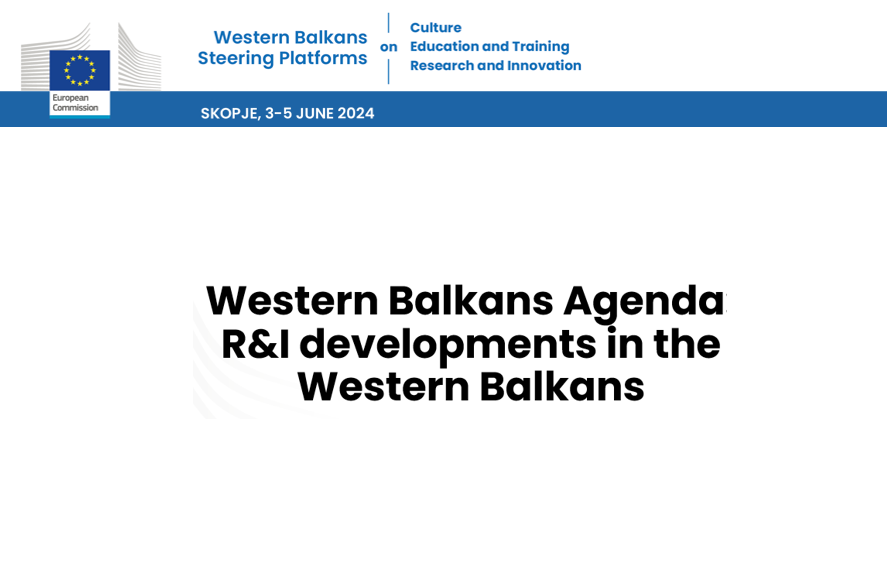At the meetings of the Steering Platform on Research and Innovation, the appointed Western Balkans delegates usually exchange information on their R&I developments and on the progresses towards the implementation of the Western Balkans Agenda.
On 4 June 2024, in Skopje, all Western Balkans representatives shared their updates. All of them are actively advancing their research and innovation landscape across various strategic dimensions. Efforts include aligning policies and legislation with EU standards, enhancing institutional frameworks, and ensuring compliance with EU requirements.
Albania highlighted its comprehensive approach to R&I which underscores its dedication to advancing both national capabilities and integration within broader European frameworks. Its Smart Specialisation Strategy should be approved by 2024 while a new Science Law is under consultation. Albania engages in collaborative initiatives such as the EU BIODIVERSA+ project and explores further partnerships through EU Joint Undertakings and ERIC initiatives. The EU for Innovation Project (2023-2026) aims to bolster Albania’s competitiveness and socio-economic recovery by strengthening the innovation ecosystem, enhancing access to financing, and promoting the Quadruple Helix approach. Furthermore, Albania is establishing the DURANA Tech Park, which will be fully functional by 2025.
Bosnia and Herzegovina adopted the Programme of Economic Reforms (PER) for 2024-2026, aimed at meeting the European integration obligations. The PER is an ambitious set of structural reforms designed to address global trends, accelerate Bosnia and Herzegovina’s convergence with EU countries, and tackle structural challenges. Some support programmes for scientific research and development projects are planned such as the Science and Technology Park (STP) in Banja Luka, which shall be established as one of the policy tools to stimulate productive linkages between new technologies, science, innovation, and fast-growing industries, thus accelerating sustainable economic development, entrepreneurship, and jobs.
In Kosovo, the Kosovo Research Information System (KRIS) has been successfully established and piloted. This platform serves for collecting and storing data for scientific research, but also as a regulatory mechanism in providing more standardised information in research., accessible. To support scientific research activities, several instruments have been introduced, including funding for small-scale research projects, support for short-term research mobility to present at international conferences, etc. Participation in Horizon Europe has improved, with a proposal success rate of 13.64% for CSA, RIA, and IA. Researchers’ involvement in the COST Association has also increased, with participation in 161 COST Actions. The first draft of the S3 strategy has been developed through internal and external consultations. Additionally, the establishment of Innovation and Entrepreneurship Centers and the Innovation and Training Park (ITP) in Prizren aims to enhance Kosovo’s innovation ecosystem.
Montenegro is well-prepared in science and research, thanks to the implementation of the Smart Specialisation Strategy, increased participation in the Horizon Europe programme, and higher government spending on research and innovation in 2023. The Innovation Fund Montenegro successfully ran eight different programme lines in 2023, supporting innovative ideas from inception to commercialisation. Since September 2021, the Fund has backed 85 projects, allocating a total of 2.68 million euros. Regarding Horizon Europe, Montenegro’s participation has already matched the entire duration of the previous Horizon 2020 programme. The country is also engaged in ongoing research and innovation policy reforms, including the new Smart Specialisation Strategy, the finalisation of the Scientific Research Strategy 2024-2028, the Roadmap for Research Infrastructure until 2028, and the Law on Scientific Research Activity. These initiatives are fully integrated into Montenegro’s Reform Agenda within the new Growth Plan for the Western Balkans. The third meeting of the EU-Montenegro Joint Committee on Research and Innovation under the Horizon Europe Association Agreement was announced to take place in Podgorica on 13 June 2024. Regarding bilateral cooperation, 18 bilateral agreements were mentioned as well as the recently expired competition for co-funding joint research projects between Montenegro and Slovenia for the period 2025-2026.
North Macedonia shows significant progress in the Horizon Europe programme, particularly in alignment with the European Commission’s strategic priorities concerning green and digital transitions. The Fund for Innovation and Technological Development (FITD), a key government institution supporting start-ups and innovative companies, was highlighted for its efforts. As of December 2022, FITD has co-financed 839 projects with a total investment of 101 million euros. The Fund currently has an open call for Innovation Vouchers in collaboration with POLICY ANSWERS. The “Smart Specialisation Strategy for the Republic of North Macedonia 2024-2027” and the “Action Plan 2024-2025” were adopted, aiming to promote green and sustainable growth by integrating knowledge, innovation, and technology to create high-value products and services for both international and domestic markets. Additionally, North Macedonia has developed a new Roadmap towards a Circular Economy. Back-to-back with the Steering Platforms meeting, North Macedonia further held its second meeting of the Horizon Europe EU-North Macedonia Joint Research and Innovation Committee.
Serbia attended the meeting after the election of a new government on 2 May 2024. New strategies for scientific and technological development, as well as artificial intelligence, were announced. The Development of Startup Ecosystem 2021-2025 strategy was highlighted, focusing on building an ecosystem to commercialize innovations and drive Serbia’s economic development. Serbia launched the e-Science system on 3 July 2023, serving as a national aggregator of metadata on scientific research outcomes. Additionally, the eInnovation platform, a registry of entities in the national innovation system, was launched at the end of 2023. Updates on Serbia’s science and research funding system were also provided, noting that research is funded through two state funds: the Science Fund Serbia and the Serbian Fund for Innovation Activities, which finance scientific research across various fields to foster development and practical application.

